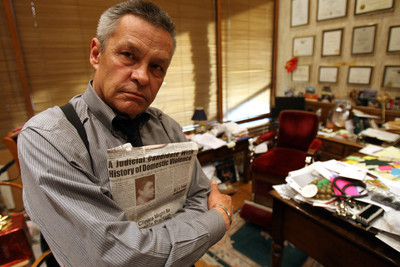Lawyer defamed, judge rules
The Las Vegas Tribune defamed a judicial candidate when it published a story accusing him of beating his wife and drinking, among other charges, a judge determined Friday.
District Judge Sally Loehrer said a March 12 story with the headline "A Judicial Candidate With History of Domestic Violence" defamed local attorney David Rivers because the accusations were false. She ordered a jury trial be held to award damages.
Las Vegas Tribune founder Rolando Larraz "has the First Amendment right to lie about anything he wants to, but that Constitutional right to publish anything you want is not without consequences," Loehrer said. "And the consequences are damages."
She didn't thoroughly discuss whether the story was written with malice, a hard-to-prove component in defamation lawsuits against public figures.
The newspaper's attorney, Chris Rasmussen, said he will appeal the decision to the Nevada Supreme Court. He added that he will ask Loehrer to recuse herself.
Saying he was "sandbagged" during Friday's hearing, Rasmussen said the newspaper would have had to reveal a confidential source to prove the accusations are true. He also questioned whether Loehrer had the authority to rule that the article is defamatory.
"This is unbelievable," he said.
Rivers is a candidate for District Court Department 10, a seat held by District Judge Jessie Walsh. He said he will ask for $1 million in damages.
"I couldn't be happier," he said.
Rivers filed a complaint and a request for a temporary restraining order after the Tribune published a front-page story claiming Rivers was born with a Hispanic name but changed it to become "more Americanized." The story, which claimed Rivers "lies and drinks," stated Rivers is an alcoholic who beat his then-wife and was fired from the law firm of Lionel Sawyer & Collins for drinking.
The story listed court documents as the source of some of the information; Rasmussen said the Tribune also used a confidential source.
Rasmussen said the newspaper probably will publish a correction on some of the allegations.
Rivers conceded that the story had a whiff of truth. He said he once slapped his wife and gave her a black eye because she was biting his hand.
He also admitted to being an alcoholic, but says he hasn't touched a drop of booze in more than 20 years.
But other parts of the story are flat out wrong, he said. Rivers, 62, was especially upset that the newspaper said he changed his name to Rivers from "Macias."
Rivers, an American Indian who is part Comanche and Apache, was born in Washington state to parents who were born in Kansas and Iowa.
"I don't think you can get more American than Native American," he said.
Judge Loehrer agreed, saying the newspaper's claim that Rivers wanted to change his name "to become more Americanized is nothing more than an attempt to defame a man who's running for political office."
Friday's hearing was to determine whether Loehrer would ban the Tribune from printing any more stories about Rivers and his mother, who also was named as a plaintiff in the complaint.
The complaint named his mother because the Tribune sullied her reputation by implying she was impregnated by a man other than Rivers' father, Rivers said.
The preliminary injunction also asked Loehrer to order the newspaper to print a retraction.
But citing procedural court rules, Loehrer expanded the hearing's scope and made a legal ruling that the Tribune defamed Rivers.
Loehrer's defamation finding didn't sit well with First Amendment proponents and members of the press. Allen Lichtenstein, general counsel for the American Civil Liberties Union of Nevada, said malice is difficult to prove but an essential element in public figure defamation cases.
A failure to prove malice or blatant disregard for the truth makes the decision easier to win on appeal, he said.
Barry Smith, executive director of the Nevada Press Association, said the story was "harsh" but wondered whether it truly was defamatory.
"It's hard to defend bad journalistic habits. For public figures, there is a higher burden to meet to prove defamation," he said.
The Tribune, a free weekly, prints about 30,000 papers and is found at downtown convenience stores, at the courthouse and at libraries, said Larraz. Known as sensationalistic, the Tribune has been sued for defamation before because of often over-the-top stories and editorials. In 1999, the Tribune was sued when it accused a private investigator of fabricating evidence in a case.
Larraz declined to comment about the defamation case this week but said the newspaper operates on a shoestring budget.
"We are very, very poor. It's a miracle it comes out every week," he said.
Contact reporter David Kihara at dkihara@reviewjournal.com or (702) 380-1039.

















